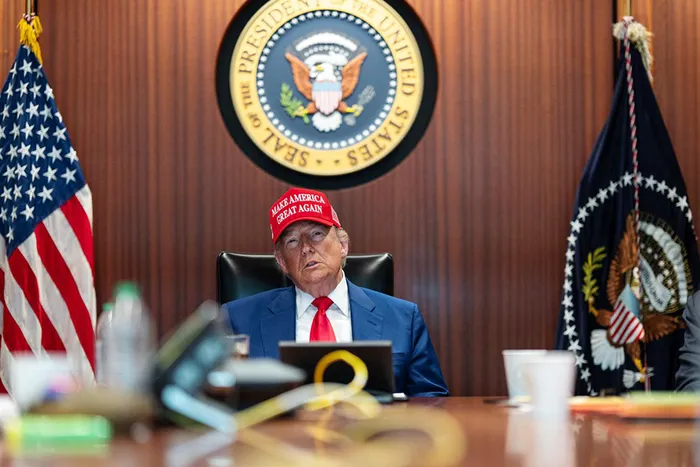How SA plans to tackle 30% US import tariff

US president Donald Trump said the August 1 deadline "will not be extended" any further.
Image: AFP
THE Department of Trade, Industry and Competition has accused the DA, its Government of National Unity (GNU) partner, of sabotaging efforts to resolve the impasse with the US that will result in South Africa exports being hit with a 30% tariff from Friday.
“Instead of providing constructive support to the efforts made by the government, the Democratic Alliance continues to release reckless statements which undermine the progress we have been making towards the 1 August deadline.
"This is downright irresponsible for a party in the Government of National Unity, and an integral part of the process. We will not, however, be deterred by this,” said Trade, Industry and Competition Minister Parks Tau in a statement Thursday night.
He said the measures his department announced in response to the tariff hike were part of their ongoing commitment to protecting jobs, preserving market access in the US and promoting export diversification to alternate markets in Africa, the EU, Asia, Latin America, and other strategic partners.
“This tariff hike poses a direct threat to our export capacity, particularly in strategic sectors such as automotive, agro-processing, steel, and chemicals amongst others. As a government, we are fully committed to supporting our exporters through this challenging time.
"We are working with urgency and resolve to implement real, practical interventions that defend jobs and position South Africa competitively in a shifting global landscape. The stakes are high and we must respond decisively to ensure our export industries remain resilient, competitive, and globally integrated into diversified markets,” he said
Asked what measures have been put in place to avoid the worst scenario, DTIC spokesperson Kaamil Alli said the department has also been working actively with industry associations and export councils to explore alternative markets for the country's goods.
Alli added that the department was also working with the National Treasury and other departments on a support package for affected industries.
The department said among the interventions was the establishment of an Export Support Desk, which will serve as a direct point of contact for companies affected by the U.S. tariff hike.
The Desk will provide updates on developments and tailored advisory services to exporters on alternative destinations, guidance on market entry processes, insights into compliance requirements and linkages to South African Embassies and High Commissions abroad.
The DA had earlier accused Tau and ANC of presiding over failed foreign policy.
“Instead of securing a trade deal, Tau now expects our Treasury to borrow or tax South Africans more to pay for the costs of the ANC’s association of our state with rogue nations like Iran. The National Treasury and by implication South Africans cannot be the funder of last resort if Tau fails to reach a US deal by midnight,” said Mark Burke, the party’s spokesperson on Finance.
On Wednesday, Minister of Mineral and Petroleum Resources, Gwede Mantashe, told journalists that the country must look for alternative markets should the US impose high tariffs, particularly in relation to critical minerals.
Mantashe added that while diplomatic engagements with the US continues, the country must also diversify its trading partners.
“The diplomatic discipline will engage the US, but it doesn’t stop us from diversifying our markets. If the US imposes high tariffs, we must look for alternative markets. Our biggest trading partner is China, it’s not the US.
''The US is number two. It means that if they impose heavy tariffs on us, we must look more for alternative markets in the world. They are there. They are available. We must exploit them,’’ Mantashe said.
The DTIC’s proposed deal features a number of areas, including importing 750-100 petajoules of Liquified Natural Gas for a 10 year period, unlocking $12 billion. Enabling agricultural market access by simplifying US poultry exports under the 2016 tariff rate quota and unlocking approximately $91m million in trade.
South African firms committed to invest $3.3bn in US industries such as mining and metals recycling, while both governments agreed to pursue joint investment in critical minerals, pharmaceuticals and agri-machinery.
Alli added that while many issues have been addressed, the challenges, however, are around agricultural imports which need to meet health and sanitary standards.
Cape Times